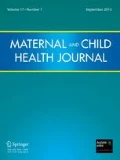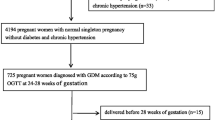Abstract
Objectives Because prior work suggests an association between high insulin concentrations in early pregnancy and excess gestational weight gain, we examined such associations in a prospective cohort. Methods Multivariate regression analysis of early pregnancy insulin homeostasis and gestational weight gain among 434 women enrolled in the MGH Obstetrical Maternal Study. Results We found that the association between insulin quartile and gestational weight gain varied depending on maternal body mass index (BMI) in early pregnancy (P for interaction <0.0001). Among women with a BMI of 20, high fasting insulin was associated with greater gestational weight gain (multivariate-adjusted predicted mean 39.6, 95% CI 30.9–40.3 lbs for Quartile 4 (Q4) vs. 31.3, 95% CI 28.6–34.1 lbs for Q1) and higher risk of excessive weight gain. By contrast, among women with a BMI of 35, higher fasting insulin was associated with lower total gain (multivariate-adjusted predicted mean 25.7, 95% CI 22.6–28.7 lbs for Q4 vs. 33.2, 95% CI 10.5–55.9 lbs for Q1) and lower risk of excessive gain. Conclusion In our cohort, early pregnancy BMI modified the association between insulin homeostasis and gestational weight gain. These associations suggest that the physiologic consequences of hyperinsulinemia differ between normal weight and obese women.

Similar content being viewed by others
References
Institute of Medicine. (1990). Nutrition during pregnancy. Washington, DC: National Academies Press.
Ehrenberg, H., et al. (2003). Low maternal weight, failure to thrive in pregnancy, and adverse pregnancy outcomes. American Journal of Obstetrics and Gynecology, 189(6), 1726–1730. doi:10.1016/S0002-9378(03)00860-3.
Schieve, L., et al. (2000). Prepregnancy body mass index and pregnancy weight gain: Associations with preterm delivery. The NMIHS Collaborative Study Group. Obstetrics and Gynecology, 96(2), 194–200. doi:10.1016/S0029-7844(00)00883-8.
Viswanathan, M., et al. (2008). Outcomes of maternal weight gain. Evidence Report/technology Assessment, 168, 1–223.
National Research Council and Institute of Medicine. (2007). Influence of pregnancy weight on maternal and child health. Workshop Report. Washington, DC: The National Academies Press.
Guelinckx, I., et al. (2008). Maternal obesity: Pregnancy complications, gestational weight gain and nutrition. Obesity Reviews, 9(2), 140–150. doi:10.1111/j.1467-789X.2007.00464.x.
Stotland, N. E., Hopkins, L. M., & Caughey, A. B. (2004). Gestational weight gain, macrosomia, and risk of cesarean birth in nondiabetic nulliparas. Obstetrics and Gynecology, 104(4), 671–677.
Bianco, A. T., et al. (1998). Pregnancy outcome and weight gain recommendations for the morbidly obese woman. Obstetrics and Gynecology, 91(1), 97–102. doi:10.1016/S0029-7844(97)00578-4.
Rosenberg, T. J., et al. (2005). Maternal obesity as diabetes as risk factors for adverse pregnancy outcomes: Differences among 4 racial/ethnic groups. American Journal of Public Health, 95(9), 1544–1661. doi:10.2105/AJPH.2005.065680.
Juhasz, G., et al. (2005). Effect of body mass index and excessive weight gain on success of vaginal birth after cesarean delivery. Obstetrics and Gynecology, 106(4), 741–746.
Rooney, B., & Schauberger, C. (2002). Excess pregnancy weight gain and long-term obesity: One decade later. Obstetrics and Gynecology, 100(2), 245–252. doi:10.1016/S0029-7844(02)02125-7.
Rooney, B. L., Schauberger, C. W., & Mathiason, M. A. (2005). Impact of perinatal weight change on long-term obesity and obesity-related illnesses. Obstetrics and Gynecology, 106(6), 1349–1356.
Schieve, L. A., Cogswell, M. E., & Scanlon, K. S. (1999). Maternal weight gain and preterm delivery: Differential effects by body mass index. Epidemiology (Cambridge, Mass.), 10(2), 141–147. doi:10.1097/00001648-199903000-00010.
Edwards, L. E., et al. (1996). Pregnancy complications and birth outcomes in obese and normal-weight women: Effects of gestational weight change. Obstetrics and Gynecology, 87(3), 389–394. doi:10.1016/0029-7844(95)00446-7.
Sewell, M. F., et al. (2006). Increased neonatal fat mass, not lean body mass, is associated with maternal obesity. American Journal of Obstetrics and Gynecology, 195(4), 1100–1103. doi:10.1016/j.ajog.2006.06.014.
Oken, E., et al. (2007). Gestational weight gain and child adiposity at age 3 years. American Journal of Obstetrics and Gynecology, 196(4), 322 e1–322 e8.
Oken, E., et al. (2008). Maternal gestational weight gain and offspring weight in adolescence. Obstetrics and Gynecology, 112(5), 999–1006.
Stuebe, A. M., & Michels, K. B. (2006). Gestational weight gain and obesity at age 18 in the daughter. American Journal of Obstetrics and Gynecology, 195(6), S228.
Scholl, T., & Chen, X. (2002). Insulin and the “thrifty” woman: The influence of insulin during pregnancy on gestational weight gain and postpartum weight retention. Maternal and Child Health Journal, 6(4), 255–261. doi:10.1023/A:1021162117177.
Thadhani, R., et al. (2003). First-trimester sex hormone binding globulin and subsequent gestational diabetes mellitus. American Journal of Obstetrics and Gynecology, 189(1), 171–176. doi:10.1067/mob.2003.343.
Wolf, M., et al. (2002). Insulin resistance but not inflammation is associated with gestational hypertension. Hypertension, 40(6), 886–891. doi:10.1161/01.HYP.0000042085.65467.9F.
Matthews, D. R., et al. (1985). Homeostasis model assessment: Insulin resistance and beta-cell function from fasting plasma glucose and insulin concentrations in man. Diabetologia, 28(7), 412–419. doi:10.1007/BF00280883.
Schieve, L. A., Cogswell, M. E., & Scanlon, K. S. (1998). Trends in pregnancy weight gain within and outside ranges recommended by the Institute of Medicine in a WIC population. Maternal and Child Health Journal, 2(2), 111–116. doi:10.1023/A:1022992823185.
Stotland, N. E., et al. (2006). Gestational weight gain and adverse neonatal outcome among term infants. Obstetrics and Gynecology, 108(3), 635–643.
Ebbeling, C. B., et al. (2007). Effects of a low-glycemic load vs low-fat diet in obese young adults: A randomized trial. Journal of the American Medical Association, 297(19), 2092–2102. doi:10.1001/jama.297.19.2092.
Schwartz, M. W., & Niswender, K. D. (2004). Adiposity signaling and biological defense against weight gain: Absence of protection or central hormone resistance? The Journal of Clinical Endocrinology and Metabolism, 89(12), 5889–5897. doi:10.1210/jc.2004-0906.
Swinburn, B. A., et al. (1991). Insulin resistance associated with lower rates of weight gain in Pima Indians. The Journal of Clinical Investigation, 88(1), 168–173. doi:10.1172/JCI115274.
Hoag, S., et al. (1995). High fasting insulin levels associated with lower rates of weight gain in persons with normal glucose tolerance: the San Luis Valley Diabetes Study. International Journal of Obesity and Related Metabolic Disorders, 19(3), 175–180.
Tremblay, A., et al. (2005). Is the insulin resistance syndrome the price to be paid to achieve body weight stability? International Journal of Obesity, 29(10), 1295–1298. doi:10.1038/sj.ijo.0803019.
Guilherme, A., et al. (2008). Adipocyte dysfunctions linking obesity to insulin resistance and type 2 diabetes. Nature Reviews. Molecular Cell Biology, 9(5), 367–377. doi:10.1038/nrm2391.
Acknowledgments
Preliminary results were presented in part at the Society for Gynecologic Investigation, Reno, Nevada, March 17, 2007. This study was supported by Clinical Investigator Awards from the American Diabetes Association and The National Institutes of Health (HD39332).
Author information
Authors and Affiliations
Corresponding author
Rights and permissions
About this article
Cite this article
Stuebe, A.M., McElrath, T.F., Thadhani, R. et al. Second Trimester Insulin Resistance, Early Pregnancy Body Mass Index and Gestational Weight Gain. Matern Child Health J 14, 254–260 (2010). https://doi.org/10.1007/s10995-009-0449-2
Received:
Accepted:
Published:
Issue Date:
DOI: https://doi.org/10.1007/s10995-009-0449-2




